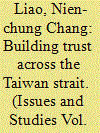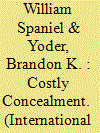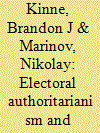|
|
|
Sort Order |
|
|
|
Items / Page
|
|
|
|
|
|
|
| Srl | Item |
| 1 |
ID:
117778


|
|
|
| 2 |
ID:
188388


|
|
|
|
|
| Summary/Abstract |
This article presents a formal model that shows how states can credibly reassure each other simply by maintaining a cooperative outward narrative. The reassurance literature to date has focused largely on costly signaling, whereby benign states must distinguish themselves by taking specific actions that hostile types would not. The mere lack of overtly expressed hostility without costly signals has been considered “cheap talk,” on the assumption that this behavior is costless for hostile states and thus uninformative. In contrast, this paper argues that maintaining a cooperative façade while secretly formulating and executing exploitative policies carries inherent trade-offs, and thus constitutes a credible reassurance signal. Foreign policy planning and implementation requires communication among various individuals, groups, and organizations, which has some probability of being observed and punished by outside actors. Yet efforts to conceal the policymaking process and reduce this probability are costly—they require investments in internal monitoring and restrictions on internal communication that can substantially degrade policy outcomes. Thus, to the extent that a state's foreign policymaking process is transparent—that is, that concealing internal communications is difficult—the absence of positive signals of hostility is a credible signal of its benign intentions. The argument is illustrated with a case study of German reassurance signals during the July Crisis preceding World War I.
|
|
|
|
|
|
|
|
|
|
|
|
|
|
|
|
| 3 |
ID:
119955


|
|
|
|
|
| Publication |
2013.
|
| Summary/Abstract |
How, if at all, do nondemocratic elections affect credible signaling in international crises? While the literature on credible signaling emphasizes the importance of electoral competition, it does not specify the minimal conditions that elections must satisfy in order to enhance the credibility of threats. We address this oversight by focusing on two fundamental properties of electoral institutions: (1) the degree of proincumbent bias and (2) the vulnerability of the incumbent to a de facto loss of power following an opposition victory. Our theory argues that both decreases in electoral bias and increases in incumbent vulnerability introduce greater accountability into the electoral process and thus enhance the credibility of public threats, even when elections fail to meet basic democratic standards. We apply these insights to the case of electoral authoritarianism, that is, regimes in which some form of electoral competition exists but basic principles of democratic governance are commonly violated. Using data on reciprocation rates in militarized crises, We show that, so long as electoral biases are sufficiently low and incumbent vulnerability is sufficiently high, even electoral authoritarian regimes are able to credibly signal resolve.
|
|
|
|
|
|
|
|
|
|
|
|
|
|
|
|
| 4 |
ID:
124976


|
|
|
|
|
| Publication |
2013.
|
| Summary/Abstract |
Existing studies of intergovernmental organizations (IGOs) and militarized conflict focus on dyadic counts of shared IGO membership. However, dyadic approaches are inconsistent with the basic properties of IGOs. Because IGOs are multilateral organizations, shared membership necessarily involves ties to third parties. This article employs network analytics to develop a novel explanation of how third-party IGO ties reduce militarized conflict. The analysis first examines the 'structural similarity' of states, defined by the extent to which states share similar patterns of IGO membership with relevant third parties. High levels of structural similarity indicate that states interact with a common set of IGO collaborators. The analysis then shows that micro-level changes in IGO membership effect changes in structural similarity, leading to the macro-level phenomenon of 'network convergence,' wherein states increasingly collaborate with the same third parties over time. Substantively, convergence results in increased overlap and integration between states' respective local networks of IGO partners. Because network convergence is costly, involving a combination of IGO-based accession, sovereignty, and alignment costs, it is unlikely to be pursued by purely exploitative state types. Consequently, convergence provides cooperative types with a mechanism for signaling a preference for cooperation over conflict. These credible signals in turn establish mutual trust among cooperators and effectively reduce the risk of militarized conflict. Extensive empirical analysis shows that, in fact, network convergence strongly correlates with a decline in militarized dispute initiations. The more that states collaborate with one another's IGO partners, the less likely they are to fight.
|
|
|
|
|
|
|
|
|
|
|
|
|
|
|
|
| 5 |
ID:
171167


|
|
|
|
|
| Summary/Abstract |
Canonical models of costly signaling in international relations (IR) tend to assume costly signals speak for themselves: a signal's costliness is typically understood to be a function of the signal, not the perceptions of the recipient. Integrating the study of signaling in IR with research on motivated skepticism and asymmetric updating from political psychology, we show that individuals’ tendencies to embrace information consistent with their overarching belief systems (and dismiss information inconsistent with it) has important implications for how signals are interpreted. We test our theory in the context of the 2015 Joint Comprehensive Plan of Action (JCPOA) on Iran, combining two survey experiments fielded on members of the American mass public. We find patterns consistent with motivated skepticism: the individuals most likely to update their beliefs are those who need reassurance the least, such that costly signals cause polarization rather than convergence. Successful signaling therefore requires knowing something about the orientations of the signal's recipient.
|
|
|
|
|
|
|
|
|
|
|
|
|
|
|
|
|
|
|
|
|